In the first week of August, local organizations active in Nepal are coming together to transform educational practices and learning through the Innovation in Education Fair. Here is an account of participating groups and why this initiative needs to be heeded to and celebrated.
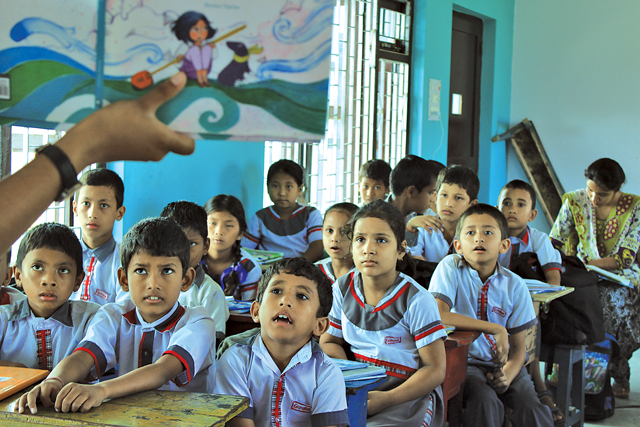 Quixote’s Cove
Quixote’s Cove
In early 2009, a small bookshop opened inside an old building in Jhamsikhel. Unlike most bookshops in Kathmandu, the founders of this new venture, Suvani Singh and Pranab Man Singh, focused on events alongside sales. For example, they hosted discussion sessions with published writers and facilitated creative writing groups. They also organized performances related to arts and literature. Gradually, the bookshop gained a unique reputation in the city, as unique as its name - Quixote’s Cove (QC). The owners were asked to manage similar events for other interested folks. Two years after establishing QC, Singh and Singh successfully organized Kathmandu’s first international literature festival, the Lit Jatra.
 However, due to soaring rent, the Jhamsikhel shop had to be closed in 2013 and shifted to an office space in Ekanta Kuna. QC’s strategies and core mission also changed a bit - instead of running its own physical space, it opened outlets in pre-established spaces like Cafe Cheeno and Ramalaya. After 2013, the owners, who are also life partners, focused even more on creative programs and projects. For example, QC manages the US Embassy Book Bus, a mobile library that travels mostly to government and community schools inside and outside Kathmandu Valley. To make this program effective, the QC team spends a lot of time coordinating with school leaders because the Book Bus program involves more than just taking books to students and teachers. Artists, educators and folks from different disciplines travel on the Bus and lead co-curricular lessons and workshops at school sites.
However, due to soaring rent, the Jhamsikhel shop had to be closed in 2013 and shifted to an office space in Ekanta Kuna. QC’s strategies and core mission also changed a bit - instead of running its own physical space, it opened outlets in pre-established spaces like Cafe Cheeno and Ramalaya. After 2013, the owners, who are also life partners, focused even more on creative programs and projects. For example, QC manages the US Embassy Book Bus, a mobile library that travels mostly to government and community schools inside and outside Kathmandu Valley. To make this program effective, the QC team spends a lot of time coordinating with school leaders because the Book Bus program involves more than just taking books to students and teachers. Artists, educators and folks from different disciplines travel on the Bus and lead co-curricular lessons and workshops at school sites.
Earlier this year, Pranab Man Singh approached two other organizations, Srijanalaya and Karkhana, who have also been working with school children in various capacities. He suggested that they pool their resources and conduct an educational fair in the summer. They would invite teachers and administrators in order to share their work with the wider educational community. They would instigate discussions and push thinking. The focus would be on innovative ideas.
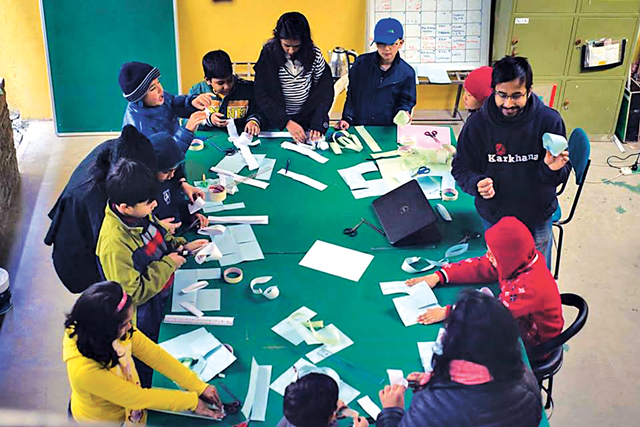 Srijanalaya
Srijanalaya
Sharareh Bajracharya, founder of Srijanalaya, agreed to curate the fair and coordinate with other participating organizations. She had returned to Kathmandu a few years ago after studying educational anthropology in the US and explored several professional options related to arts and education. She even joined an arts program at Kathmandu University Center for Arts and Design, and in 2012, was a coordinator of the Kathmandu International Arts Festival. But her goals eventually led her to establish Srijanalaya in 2013. Deeply concerned with social justice, Bajracharya and her team have since worked with young children - especially those that come from underprivileged backgrounds - and engaged them in art activities. The team believes that art activities provide healthy outlets for children to express their thoughts and emotions. It is also a way to engage disinterested students in learning new things.
With arts education as its core mission, Srijanalaya has also managed artist residencies and guided tour programs at Nepal Arts Council and the International Mountain Museum in Pokhara. After the April, 2015 earthquake, the team visited government schools and conducted art workshops with children in order to provide socio-emotional support in times of distress. They have also been running the ArtWorks program, funded by Shikshya Foundation Nepal, which involves travelling to remote school communities and working with local students and teachers. Eventually, the Srijanalaya team intends to develop art materials that align with government curricula and support teachers who want to run effective art programs.
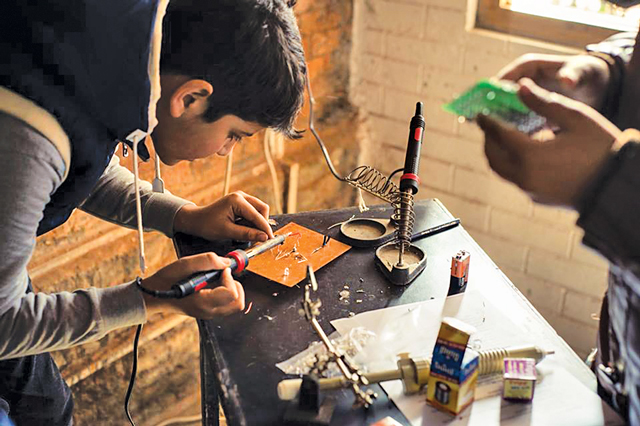 Karkhana
Karkhana
Apart from QC and Srijanalaya, Karkhana is the third organizer of the Innovation in Education Fair that is going to take place on August 5, 6 and 7 in Tangalhood. Similar to the other two organizations, Karkhana’s core ideas, as well as its mission, have evolved since its inception. Over the years, founders Sakar Pudasaini and Pavitra Gautam have assembled a solid team and introduced them to cutting-edge educational ideas and practices. Grounded in design and technology, the Karkhana team believes that hands-on work with objects fosters creativity and deeper understanding. They take this belief to middle school classrooms in the form of activities and lessons. Currently, Karkhana runs two different programs - Karkhana Innovators Club, which is an after-school program that engages children in project based learning, and BeeCreative, a co-curricular program that supports teachers who are interested in aligning lesson plans with Karkhana’s pedagogy. Karkhana is currently working with 18 private schools and five government/community schools and has already developed over 150 lesson plans.
Aside from directly working with schools, Karkhana also co-organizes the annual Yantra, an Art/Science/Tech festival, that brings artists, engineers, architects and social scientists together in interdisciplinary projects. Karkhana also instigated MakerKT, a workshop module targeted at teaching technological skills to women. Karkhana members have participated in various international fairs, forums and festivals. During the three-day August fair, Karkhana will host workshops with middle school students and coordinate a conference with major stakeholders in the field of education.
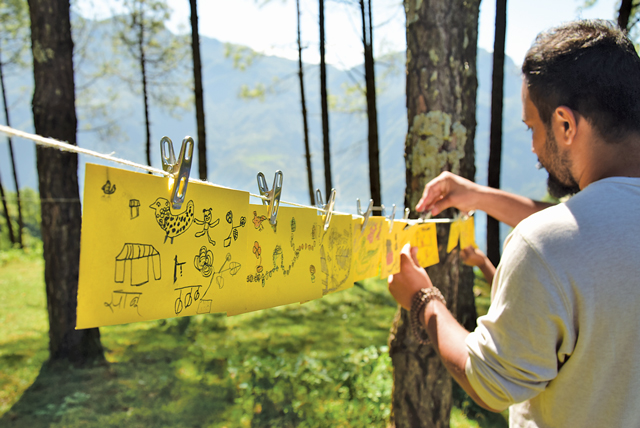 Outside the Classroom
Outside the Classroom
Nepal’s traditional education system has focused on theories, formulas, inane rules and routines that are disconnected from students’ immediate lives. With a high emphasis on end-of-year exams, students are expected to rote learn text-heavy lessons and regurgitate them on answer sheets. Education, conducted in this manner, becomes impersonal and unstimulating to students. Furthermore, since most teachers do not facilitate critical thinking and problem solving, even the students who end up memorizing facts may not know how to apply them in real-life settings.
The Karkhana booklet states that knowledge is power only when you know how to use it. To that end, the focus is on the process of learning, on collaborating and exchanging ideas with each other. By working with and manipulating objects, learning becomes “visible” and concrete for young students who often struggle to understand obscure concepts. Karkhana believes that the world is malleable. In other words, the human mind has the capacity to create things and adapt them to make our lives more efficient, which is a basic, foundational premise of science and technology. By directly applying this premise to their lesson plans and activities, Karkhana’s dynamic approach supplements school curricula.
In today’s high-paced globalized world, it is imperative to think of education in a different way. Srijanalaya’s focus on arts education, a discipline generally ignored and misunderstood, is rich with possibilities. New bodies of research have revealed that the arts can provide multiple pathways to understand the world better and interact with it in an active way. A considerable number of children cannot access text-heavy lessons, many studies have demonstrated. Since human beings are diverse, we also have diverse ways of learning. Incorporating arts activities in the general school curricula is an effective way of targeting multiple intelligences and supporting those with different learning styles towards a path of growth and success.
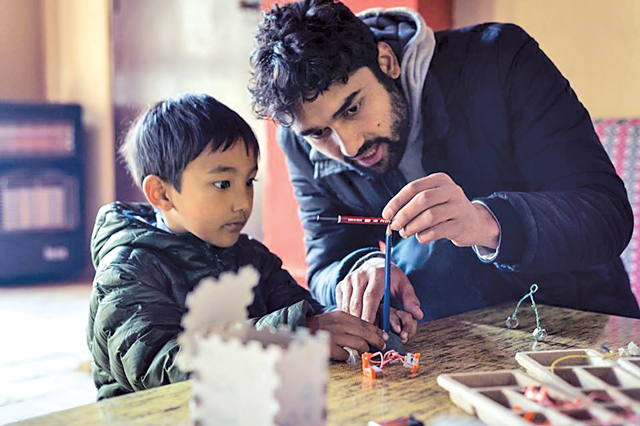
On the other hand, QC extends the basic idea of education and takes it outside the classroom. During its initial phase, QC set up school libraries and trained teachers. It is extremely important to introduce good reading habits to students at an early age so that a love for reading can be fostered. To disseminate these ideas, QC organizes literacy and pedagogy courses. Aside from the Book Bus, QC manages the Danish Embassy sponsored “Write to Speak” project that introduces slam poetry to students all over Nepal. Since the project enables expressions of thoughts and feelings, it has become widely popular and effective.
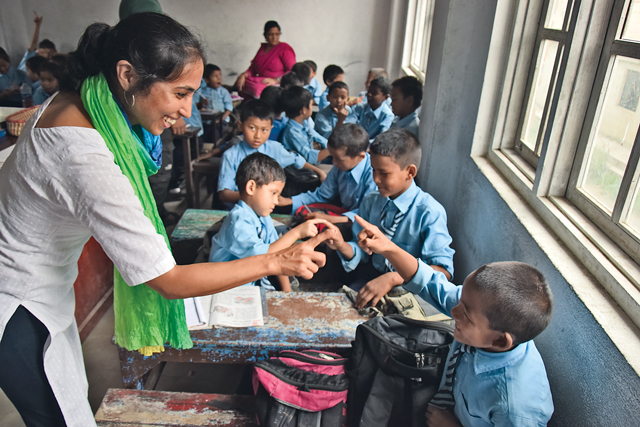
The Fair
The Innovation in Education Fair will be a source of new ideas and energy. Several other organizations have partnered with the core team. Representatives will lead workshops and perform during the three-day fair. For example, Albertina Barcelo of Kathmandu Jazz Conservatory will talk about the importance of music education in children’s development. The Kathmandu University Center for Arts and Design will put up a collaborative mural and speak about their process with interested visitors. There will be a presentation by Nepal Picture Library on their ongoing Retelling Histories educational program which was piloted at several schools last year. Open Learning Exchange Nepal (OLE) and Nepal Prakriti Pathsala are also on board and will interact with visitors.
Additionally, Sunita Maharjan and Subima Shrestha, board members of Srijanalaya, will run visual arts and movement workshops and put up dance and theater performances. The Book Bus will introduce various strands of their English and Science programs - racial discrimination, Newton’s third law and literacy strategies in primary school classrooms. The Word Warriors will lead a session titled “Spoken Word Poetry: Teacher’s Edition” and Karkhana will talk about “Running the Design Challenge in Schools”.
The organizers intend to sensitize school leaders and policymakers to these crucial ideas. They are hoping that those working in Nepal’s education sector will enthusiastically participate and engage with them during the fair. There will be opportunities to learn new techniques and plan strategies to incorporate them in schools, an ideal platform for principals and directors looking for ways to implement change in school programs.
Educators should strive to develop the minds and characters of students. The Innovation in Education Fair promises to inspire leaders inclined to make teaching and learning fun and engaging, personal and meaningful, rigorous and challenging. Here is hoping that by coming together and participating, everyone’s capacity to imagine a productive and harmonious future for Nepal will be expanded.










